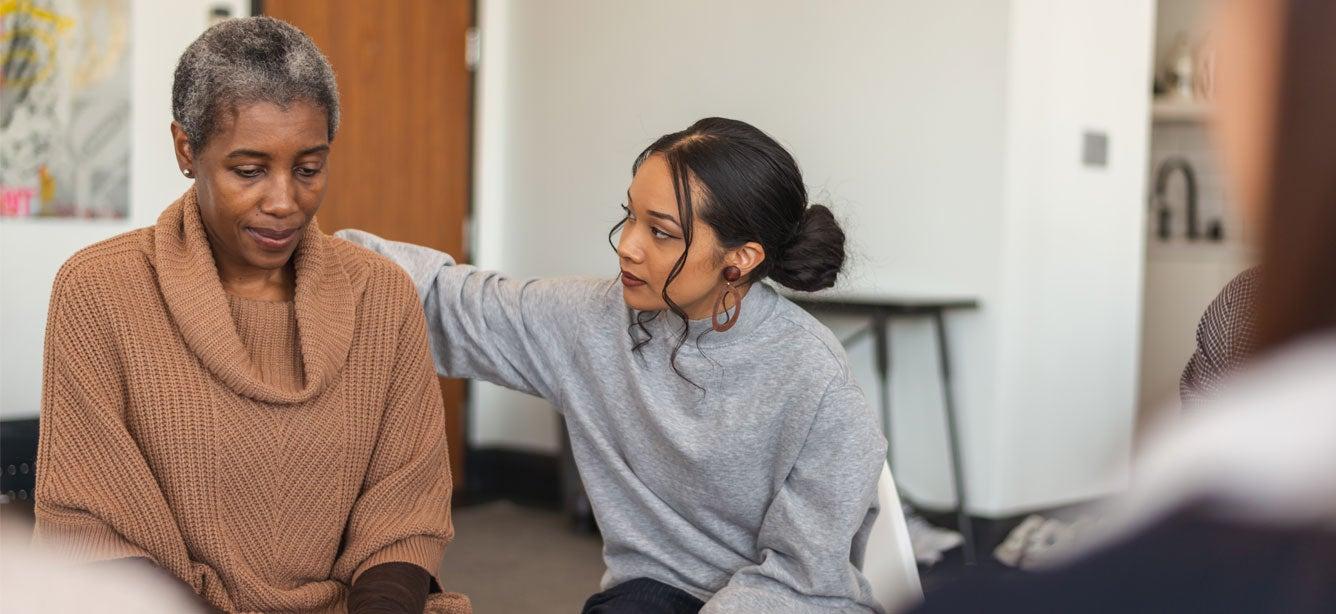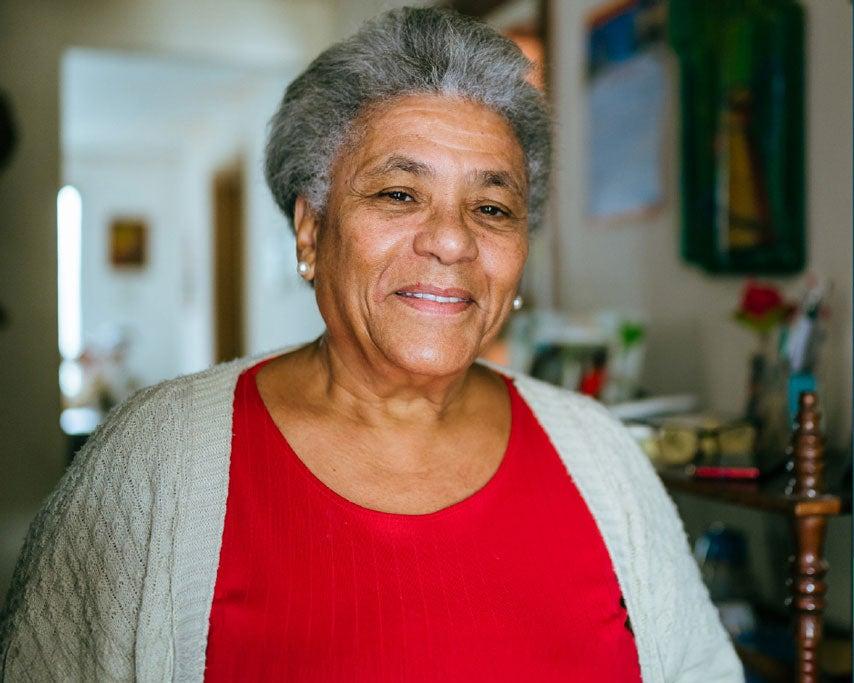
Explore these proven behavioral health programs for older adults:
- Healthy IDEAS is a depression self-management program designed to detect and reduce the severity of depressive symptoms in older adults with chronic conditions and functional limitations. It includes screening and assessment, education, referral to appropriate health professionals, and behavioral activation.
- PEARLS is a highly effective method designed to reduce depressive symptoms and improve quality of life in older adults and in all-age adults with epilepsy. During six to eight in-home sessions that take place in the client’s home and focus on brief behavioral techniques, PEARLS counselors empower individuals to take action and make lasting changes so that they can lead more active and rewarding lives.
- BRITE is a substance abuse screening and intervention program for older adults who are experiencing issues with alcohol, prescription medication, over-the-counter medication, or illicit drugs. The program aims to identify non-dependent substance use or prescription medication issues and provide effective service strategies prior to an individual’s need for more extensive or specialized substance abuse treatment. \
- Wellness Recovery Action Plan (WRAP®) is an evidence-based manualized group intervention for illness self-management delivered in a self-help group context (in-person or online). WRAP guides participants through the process of identifying and understanding their personal wellness resources (“wellness tools”), and then helps them to develop an individualized plan to use these resources to manage daily stress and symptoms.
- BRI Care Consultation™ (BRI-CC) is an evidence-based care-coaching program, delivered conveniently through telephone and email, uses a combination of on-going assessment, action planning and follow-up to create meaningful, lasting improvements in the care environment, resulting in a decrease in unmet needs, stress and strain, and symptoms of depression for both caregivers and the person receiving care.
- HomeMeds is a medication safety intervention focused on In-home collection of a comprehensive medication inventory, interview related to adherence and potential adverse effects (falls, dizziness, confusion), and documentation of two-position vital signs. The goal of the program is to resolve medication duplication and potential interactions.
See all evidence-based programs approved for use with Older Americans Act Title III-D Funding.
Highlights from the community
NCOA houses the National CDSME Resource Center to support community-based organizations across the nation in implementing, expanding, and sustaining evidence-based health promotion programs. Addressing mental health is an integral part of managing ongoing health conditions. The Administration for Community Living has been offering grants since 2003 for the expansion, implementation, and sustainability of CDSME programs. Grantees represent different entities in various states with goals and activities tailored to reach their target population.
View profiles for each grantee with details on their goals, strategies, activities, interventions, partnerships, and anticipated results.
| Type of Evidence-Based Program | Participants 2010-2024 |
| All Chronic Disease Self-Management Programs | 508,181 |
| Healthy IDEAS, PEARLS, SBIRT, WRAP | 5,174 |
- Metropolitan Community Health Services (MCHS), based in Washington, NC, is a Federally Qualified Health Center that offers integrated medical, behavioral health, dental, and pharmaceutical services. MCHS offers a suite of CDSME programs, including the Chronic Disease Self-Management Program (CDSMP), Chronic Pain Self-Management Program (CPSMP), Diabetes Self-Management Program, and workplace Chronic Disease Self-Management Program. As part of their grant work, MCHS also integrates SBIRT as part of their regular practice. All patients seen at MCHS undergo the SBIRT protocol, a 2 question screen followed by a more comprehensive screen if indicated. Staff from the behavioral health department have been formally trained in SBIRT and the MCHS electronic health record (EHR) system has been augmented to better capture the full experience of SBIRT, from the initial screening to the in-house referral, to treatment, to bi-directional notes on attendance, and completion of services. MCHS has implemented a triangle model for SBIRT and behavioral health that consisted of three major interventions: Medication-Assisted Treatment (MAT), Counseling, and Chronic Pain Self-Management Program. Patients identified from the Behavioral Health Department of MCHS are referred to this "triangle" and participate in CPSMP as part of their overall treatment plan. All MAT patients are referred to CPSMP or CDSMP and reimbursement pathways are formed. MCHS has successfully integrated referrals for SBIRT and CPSMP services into their EPIC EHR.
- Pennsylvania Department of Aging’s (PDA) primary 2021 grant goal is for all 46 Area Agencies on Aging (AAAs) serving 58 counties in the state to implement and offer Healthy IDEAS to all Pennsylvanians 60 years old and older in need of a mental health intervention. Additionally, PDA is in the process of developing and implementing a standardized suicide intervention protocol for all AAAs to have in place, whether or not they are offering Healthy IDEAS. This is to ensure the staff at all AAAs can serve any older adult that comes into the facility feeling distraught and can intervene any suicide thoughts or attempts.
- The Maryland Living Well Center of Excellence (LWCE) received a 2021 CDSME grant focused on leveraging state, clinical, and community partnerships to reduce depression and chronic pain. During the COVID-19 pandemic, the LWCE observed a sharp increase in risk of depression among older adults and adults with disabilities due to required social distancing. Through this initiative, Mac, Inc. is working with partners across the state to increase implementation of CPSMP, PEARLS, and EnhanceFitness as a coordinated intervention to reduce symptoms of depression and improve quality of life among older adults. As of 2022, 153 individuals had decreased depression scores on the Patient Health Questionnaire-9 following participation.
- Rush University Medical Center received a 2022 CDSME grant that is focused on expanding the availability and sustainability of the WRAP program throughout the West Side of Chicago to support individuals with mental and emotional health issues, as well as to increase healthy discussions and challenge stigma of mental health issues. Rush will partner with the West Side Health Equity Collaborative (WSHEC) to integrate CDSMEs into the WSHEC’s Medicaid Transformation project, which includes almost 50 partners.
- New Mexico Department of Health received a 2023 CDSME grant focused on increasing participation for DSMP and Spanish DSMP as well as introducing PEARLS to the state of New Mexico, focusing on specific counties with the highest rates of diabetes and depression. In their first grant year, 10 coaches were trained in PEARLS, two of whom are bilingual and working with underserved communities.
- University of Kentucky, Louisville received a 2024 CDSME grantee to implement DSMP, BRI-CC, and PEARLS in underserved and rural counties. One of their grant goals is to have 88 people with dementia and their caregivers complete BRI-CC with a reduction in perceived unmet needs, relationship strain, symptoms of depression, and emergency room visits. This is the first time an ACL CDSME grantee has offered BRI-CC. University of Kentucky, Louisville also aims to have 104 older adults complete PEARLS with reduced symptoms of depression.
Older Adult Mental Health Awareness Day
The National Council on Aging was proud to host the 7th Annual Older Adult Mental Health Awareness Day Symposium on May 2, 2024, focused on the importance of collaboration and communications across sectors to address mental health, with an emphasis on bringing services to older adults in a coordinated way.
This event was co-sponsored with the U.S. Administration for Community Living, the Health Resources and Services Administration, and the Substance Abuse and Mental Health Services Administration. Registration was free and included a full day of sessions on how to best meet the mental health needs of older adults. In partnership with Rush University’s E4 Center of Excellence for Behavioral Health Disparities in Aging, NCOA offered free continuing education credit for several professions.
The sessions featured individuals sharing their personal mental health stories as well as highlighted research findings on the state of mental health in older adults and promising programs and interventions. The symposium was well-attended, with 5,100 joining the live event, which featured the “Mother of Black Hollywood” and “Black-ish” actress Jenifer Lewis as the keynote speaker.



